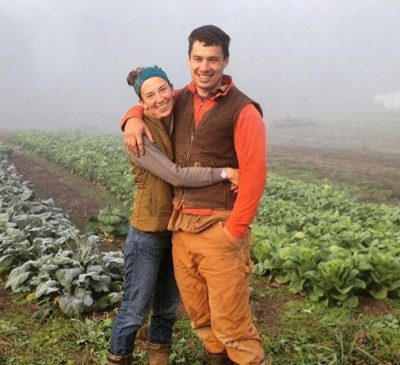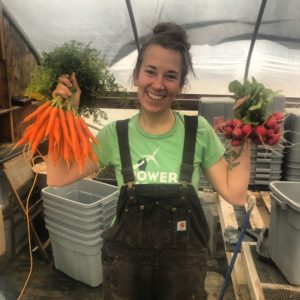
The next generation of New Jersey farmers is young, but more concerned with the future of farming than with being hip.
“If you change the way people eat, you change the way they treat the world,” says Stephanie Spock, 31, half of the duo behind Rolling Hills Farm, a sustainable farm in Lambertville.
Spock and farming partner John Squicciarino, 31, met in 2012 while working at Double Brook Farm in Hopewell. They found farming from different paths. Spock’s environmental science degree led her to work in national parks, where she subsisted on canned produce despite working in nature’s bounty. “I had to eat canned and dehydrated vegetables in the height of produce season,” she says.
Squicciarino’s story is more romantic. As a restaurant worker in his 20s, he saved money to travel and ended up working an olive harvest in Italy. “We’d spend all day picking olives by hand in the beautiful mountainous countryside,” he says. Tossing fresh-pressed olive oil with garlicky pasta was dinner, and a revelation. “I had never consumed something as fresh and delicious.”
In 2014, the pair opened Rolling Hills, located just east of the Delaware River. The farm utilizes row covers and insect netting that function as natural pesticides. Kelp meal, cover crops, and organic compost help enrich the soil for spinach, baby arugula, baby kale, peppers, tomatoes, squash, and cucumbers (no, no corn).
“We would never want to grow on more than 10 acres,” says Spock. Rolling Hills is successful for its size, but the farm is up against tricky institutional obstacles, including the farmers’ market model itself. Some people still see the local farmers’ market as quaint, something to do on a Sunday morning instead of a way to shop or live. “Changes in the food system happen when something becomes normalized,” says Spock, who has studied U.S. food systems as she pursues a master’s in nutrition. “I see a future where it isn’t looked at as elitist when you want to know where your food comes from, but normal.”
In preparation for Rolling Hills, Spock worked at an 800-acre conventional wheat farm—the kind we rely on for morning toast— in order “to understand the downfalls of large-scale agriculture.” The conventional farm was small “as far as wheat farms go,” says Spock, but still “everything was sprayed with chemicals. Any living creature was shot or gassed. There were no bees.” (Which, as we increasingly understand, is very bad news.)

Stephanie Spock of Rolling Hills Farm. Photo courtesy of Rolling Hills Farm.
Even if you’re not an eco-conscious consumer, there are reasons to abandon supermarket produce. “The produce you buy in the grocery store is bred for long shelf-life, not for nutrition,” says Spock. “Produce continues to respire and breathes out its stored nutrients. Most produce you get in the grocery store is days, or weeks, old.”
Fortunately, alternatives like Rolling Hills are on the rise in New Jersey. “I see so many small-scale farms popping up every day,” says Spock. “I don’t see them as competition.”
The key to New Jersey’s agricultural health may rest in the soil-crusted hands of millennials like Spock and Squicciarino. “In our immediate circle, most of the farmers I know are young farmers,” says Squicciarino.
Most of Spock’s peers in the environmental studies program went on to work for fracking companies, the opposite of what she wanted. “Farming felt right,” she says. “It felt like something tangible I could do to have an impact on the world.”
Rolling Hills sells produce at farmers’ markets in Asbury and Holmdel. They offer CSA-style market subscriptions ranging from $250 to $575.



